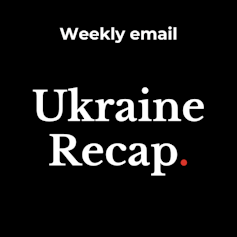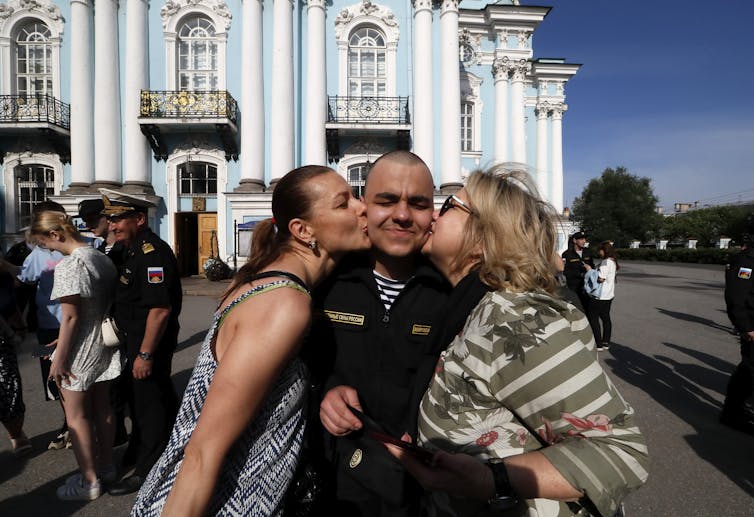Ukraine’s troops stay annoyed at delays in getting recent provides of arms and ammunition, in line with stories from the frontline. It’s been a number of months for the reason that US and the EU signed off on their huge support packages to Kyiv, but the majority of the weapons have but to search out their approach to the Ukrainian preventing items.
In keeping with the Institute for the Research of Struggle, these delays are hampering Ukraine’s potential to counter what it calls Russia’s “creeping advances”. Russia’s potential to use stress at quite a few factors alongside the frontlines successfully signifies that it’s arduous for Ukraine to construct up the energy to launch its personal offensive operations. That is the place the dearth of recent provides of western weapons methods is being felt most.
In the meantime, shortages of educated and motivated personnel additionally stays an issue for Kyiv. Oleksandr Syrsky, Ukraine’s commander-in-chief, instructed the nation’s Interfax information company on July 2 that the power to recruit and prepare adequate personnel to type well-staffed and geared up new brigades stays an issue.
Institute for the Research of Struggle
However nonetheless Kyiv stays decided to not compromise on its maximalist struggle goals on its willpower to claw again all its authentic territory. Andriy Yermak, Volodymyr Zelensky’s chief of employees, mentioned this week that whereas Kyiv welcomed recommendation on easy methods to attain a “simply peace”, Ukraine is “not able to go to the compromise for the crucial issues and values … independence, freedom, democracy, territorial integrity, sovereignty”.

Since Vladimir Putin despatched his struggle machine into Ukraine on February 24 2022, The Dialog has referred to as upon a number of the main specialists in worldwide safety, geopolitics and army ways to assist our readers perceive the large points. You may as well subscribe to our fortnightly recap of skilled evaluation of the battle in Ukraine.
His remarks got here a day after Zelensky rejected a ceasefire proposal introduced by the Hungarian prime minister, Viktor Orbán, who was visiting Kyiv for the primary time for the reason that starting of the struggle. Orbán, who has simply taken over the rotating presidency of the European Council, is thought to be near Vladimir Putin, and was largely answerable for delaying the sign-off of the EU’s €50 billion (£42 billion) support bundle for a number of months earlier this 12 months.
No matter Orbán’s allegiances might or will not be, Kyiv not too long ago signed a bilateral safety cope with the EU, the twentieth such settlement signed with nations throughout Europe and the US. Whereas the settlement requires the EU and its members to contribute to “safety commitments” that may “assist Ukraine to defend itself”, Stefan Wolff factors out that they cease wanting offering precise safety ensures or committing troops to Ukraine’s defence.
Wolff, an skilled in worldwide safety on the College of Birmingham, who has been contributing common evaluation of the battle to The Dialog, says Ukraine’s western companions nonetheless concern that this may result in an escalation which could pull Nato into the struggle.
However the coaching being offered by Kyiv’s western companions and the army support (as soon as it begins to reach in quantity) shall be invaluable in serving to Ukraine attempt to flip the tide in opposition to Putin’s struggle machine.
However Wolff additionally advises warning. Home politics in a number of of Kyiv’s allies, chief amongst them the US and France, signifies that western help stays unsure. If, for instance, Donald Trump regains the White Home within the November election, it’s going to throw US help into jeopardy, he writes.
Learn extra:
Ukraine struggle: Kyiv rejects Orbán ceasefire plan however international safety offers provide hope
The prospect of a Trump victory was additionally clearly exercising the minds of the G7 leaders earlier in June once they gathered in southern Italy, the place they mentioned the thought of utilizing the US$300 billion (£235 billion) of frozen Russian belongings in western jurisdiction to leverage a US$50 billion mortgage to Kyiv to additional fund its defence.
Sambit Bhattacharyya, a professor of economics on the College of Sussex Enterprise College, explains how the deal would work and weighs up the attainable dangers and rewards, amongst them the prospect the deal received’t be finalised earlier than the US election.
Learn extra:
G7 plan to make use of Russia’s frozen monetary belongings to assist Ukraine fund the struggle: an economist weighs up the danger and rewards
Nonetheless on Kyiv’s western allies, Nato marks its seventy fifth anniversary this month (extra about that in subsequent Ukraine recaps) and can meet in Washington DC from July September 11, the place defence budgets throughout the 32 member states shall be excessive on the agenda. One other vital problem shall be easy methods to coordinate defences in opposition to what seems to be a concerted marketing campaign of sabotage, each actual and digital, throughout Europe.
Alexander Gilder, an skilled in worldwide regulation and safety on the College of Studying, writes that whereas Nato’s army capability is appreciable (the alliance not too long ago performed its biggest-ever army workouts for the reason that finish of the chilly struggle in Lithuania), it’s going to want an in depth deal with collective intelligence gathering to fight what seems to be a gathering storm of hybrid warfare.
In the meantime, Nato headquarters in Europe is at present present process a significant transition from a strategic to a war-fighting command centre. This displays the rising danger of an assault on one or one other of its European members and the precept of collective defence enshrined by article 5 of its constitution.
Learn extra:
Nato’s Washington summit might want to deal with Russian sabotage and myriad safety threats
On condition that Jens Stoltenberg is because of step down as Nato secretary-general in October, the particular person anticipated to supervise a lot of this transition will – barring unexpected circumstances – be the outgoing Dutch prime minister, Mark Rutte.
Lars Brummel, an skilled in European politics at Leiden College, offers us this profile of Rutte, who’s often known as “Teflon” Mark for his potential to emerged unscathed from myriad political crises through the years.
Learn extra:
Nato’s subsequent secretary normal is outgoing Netherlands prime minister, ‘Teflon’ Mark Rutte
Many Nato members are responding to the gathering menace of battle in Europe by reviewing their army recruitment and conscription insurance policies, writes Dafydd Townley, an skilled in worldwide safety on the College of Portsmouth.
The problem was put firmly on the agenda within the US by Christopher Miller, a former under-secretary of protection in Trump’s administration, who is assumed prone to play an enormous position on the Pentagon if his outdated boss is returned to the White Home. Miller mentioned that nationwide service ought to grow to be a “ceremony of passage” within the US, not simply within the army, however usually. Townley appears at how this would possibly work, and likewise examines how different Nato members, together with the UK, would possibly address the necessity to quickly increase their armed forces.
Learn extra:
US kicks off debate on conscription as different Nato members introduce drafts
On the Russian entrance
Russia, in the meantime, has been attempting to shut as many loopholes as attainable which have enabled its younger males to keep away from being drafted. Anastassiya Mahon, who specialises in safety points on the College of Aberystwyth and has a deal with Russia, says till now it has been comparatively simple for folks to keep away from conscription.

EPA-EFE/Anatoly Maltsev
One of many causes for this, she writes, is that it’s important to really obtain a paper draft discover. Many younger Russians have discovered a approach to keep away from by both giving the incorrect deal with or just leaving the nation, which they’ve finished of their tons of of hundreds.
From November there shall be a brand new system in place which can collate a wide range of info on Russian residents on-line and can allow digital draft notices to be despatched out. It will make it nigh on not possible for draft dodgers to go away the nation as border guards will be capable to entry this. One other wave of conscription is anticipated within the autumn.
Learn extra:
Ukraine struggle: Russia toughens up draft regulation to round-up extra folks for the frontlines
We detailed a fortnight in the past how Putin’s “love-in” with North Korean strongman Kim Jong-un was serving to him purchase bulk provides of weapons and ammunition which has given Russian troops the sting on the battlefield in latest months. Putin made a lot of their pact as a part of a brand new “multipolar” world order geared toward combating US hegemony.
Putin’s most vital ally, although, is China. It’s a distinct relationship, although. Ostensibly a “friendship with out limits”, it seems to be more and more one in all supplicant and patron, with Beijing within the dominant position. One of many important causes for this, writes Renaud Foucart, an economist at Lancaster College, is Moscow’s dependency on Beijing for purchasing its gasoline, the one main financial system nonetheless doing so.
It’s not simply gasoline in fact. As Foucart writes, since Russia was lower off from the worldwide banking system in 2022, it has grow to be more and more depending on China in all sectors of the financial system to the extent that the Chinese language yuan now accounts for 54% of trades in Russia’s inventory market. And 90% of Russia’s import of “excessive precedence” dual-use items now come from China. These embody digital elements, radars, sensors – with out which it couldn’t construct superior army {hardware}.
Foucart believes China has the facility to drive Russia to finish the battle, and factors to rising financial stress from the US and EU for it to just do that.
Learn extra:
Russia has grow to be so economically remoted that China may order the top of struggle in Ukraine
In the meantime the trial of Wall Road Journal reporter, Evan Gershkovich, continues in Moscow. James Rodgers, a former BBC correspondent in Moscow now professor of journalism at Metropolis College in London and his colleague, historian Dina Fainberg, chart the disintegration of press freedom in Russia underneath Putin and draw parallels with the unhealthy outdated days underneath Josef Stalin and his heirs.
Learn extra:
Espionage trial of US reporter Evan Gershkovich alerts a harmful new period for journalism in Russia
Ukraine Recap is obtainable as a fortnightly e-mail e-newsletter. Click on right here to get our recaps immediately in your inbox.




















